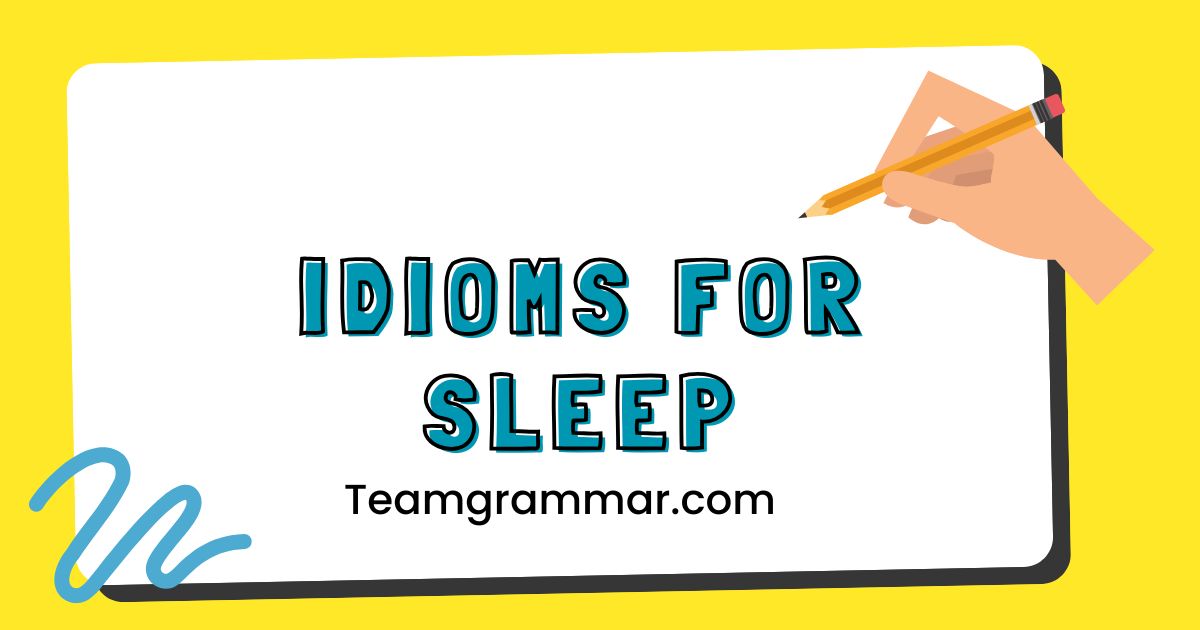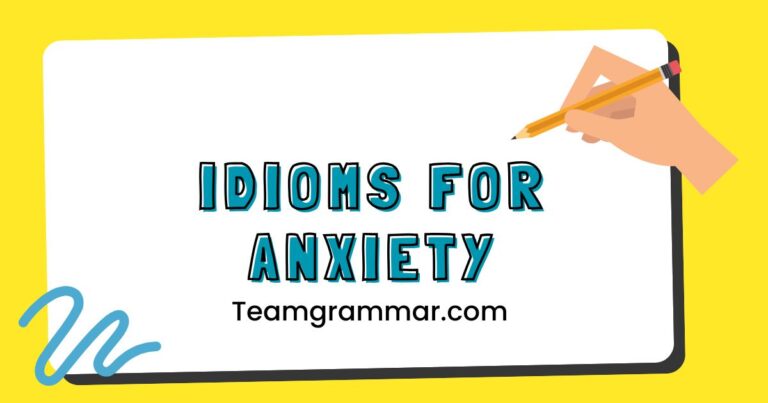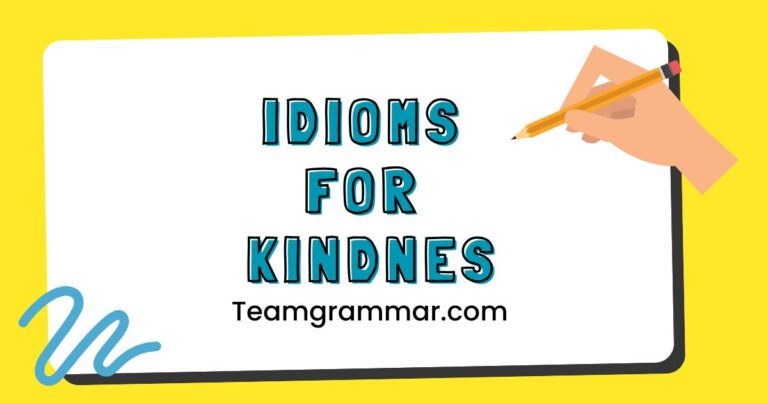35 Idioms for Sleep: Mastering English Sleep Expressions
Sleep is a fundamental human need, and naturally, it’s a rich source of idiomatic expressions in English. Understanding idioms related to sleep can significantly enhance your comprehension and fluency.
These idioms often paint vivid pictures and convey nuanced meanings that go beyond literal interpretations. This article will provide a comprehensive guide to sleep-related idioms, their meanings, usage, and examples.
Whether you’re an ESL learner or a native speaker looking to refine your understanding, this guide will help you master the art of using sleep idioms effectively.
Table of Contents
- Introduction
- Definition of Idioms for Sleep
- Structural Breakdown
- Types and Categories of Sleep Idioms
- Examples of Idioms for Sleep
- Usage Rules for Sleep Idioms
- Common Mistakes with Sleep Idioms
- Practice Exercises
- Advanced Topics
- FAQ
- Conclusion
Introduction
The English language is replete with idioms, and those related to sleep are particularly colorful and expressive. These idioms offer unique insights into how we perceive and discuss sleep in everyday conversations.
Mastering these idioms not only improves your vocabulary but also helps you grasp the cultural nuances associated with sleep in English-speaking communities. This article is designed for English language learners, teachers, and anyone interested in expanding their knowledge of idiomatic expressions.
By the end of this guide, you will be able to confidently use and understand a wide range of idioms related to sleep.
Definition of Idioms for Sleep
Idioms for sleepare expressions whose meanings cannot be understood from the literal definitions of the individual words they contain. Instead, these idioms have evolved over time to convey specific meanings related to the act of sleeping, the quality of sleep, or the state of being asleep or awake.
They add color and depth to our language, allowing us to express complex ideas and emotions in a concise and memorable way. Understanding sleep idioms is crucial for effective communication and comprehension in English.
Idioms can be classified based on their function. Some idioms function as verbs, describing the action of sleeping or falling asleep.
Others function as adjectives, describing the quality of sleep (e.g., sound sleep). Still others function as adverbs, modifying how someone sleeps (e.g., sleeping like a log).
The context in which an idiom is used is essential for interpreting its meaning correctly. For example, “hit the hay” means to go to bed, while “sleep on it” means to think about something before making a decision.
Structural Breakdown
Sleep idioms generally follow standard English grammatical structures, but their meaning is non-literal. They can be structured as phrases, clauses, or even full sentences.
Many involve verbs related to sleep, such as “sleep,” “doze,” “nap,” or “dream.” Others use metaphorical language to describe sleep indirectly, such as comparing sleep to a deep state or a physical object. Understanding the grammatical structure helps in identifying and interpreting idioms correctly.
The structure often includes a verb and a prepositional phrase (e.g., “out like a light”) or a verb and an adverb (e.g., “sleep soundly”). Some idioms use similes, comparing sleep to something else using “like” or “as” (e.g., “sleep like a baby”).
Others use metaphors, directly equating sleep to something else (e.g., “catch some z’s”). Recognizing these structural patterns can aid in deciphering the meaning of unfamiliar idioms.
Types and Categories of Sleep Idioms
Sleep idioms can be categorized based on the aspect of sleep they describe. Here are some common categories:
Idioms About Falling Asleep
These idioms describe the act of going to sleep. They often convey how quickly or easily someone falls asleep.
Idioms About Sleeping Soundly
These idioms describe the quality of sleep, often emphasizing how deeply or peacefully someone is sleeping.
Idioms About Difficulty Sleeping
These idioms describe the experience of struggling to fall asleep or stay asleep. They often convey feelings of restlessness or anxiety.
Idioms About Being Asleep
These idioms describe the state of being asleep, often focusing on how unaware or unresponsive someone is.
Idioms About Waking Up
These idioms describe the act of waking up, often conveying how easily or reluctantly someone wakes up.
Examples of Idioms for Sleep
Here are some examples of idioms related to sleep, categorized for easier understanding:
Table 1: Idioms About Falling Asleep
This table provides a list of idioms related to falling asleep, along with their meanings and example sentences. These idioms often describe how quickly or easily someone falls asleep.
| Idiom | Meaning | Example Sentence |
|---|---|---|
| Hit the hay | Go to bed | I’m exhausted; I’m going to hit the hay. |
| Hit the sack | Go to bed | After a long day at work, all I wanted to do was hit the sack. |
| Turn in | Go to bed | It’s getting late; I think I’ll turn in. |
| Call it a night | Go to bed or end an activity for the evening | We’ve been working for hours; let’s call it a night. |
| Drift off | Gradually fall asleep | I drifted off while watching TV. |
| Drop off | Fall asleep quickly and unintentionally | He dropped off in the middle of the movie. |
| Nod off | Fall asleep briefly and unintentionally | I nodded off during the lecture. |
| Be out like a light | Fall asleep very quickly | As soon as his head hit the pillow, he was out like a light. |
| Go to the land of Nod | Go to sleep | Time to go to the land of Nod after such a tiring day. |
| Catch some z’s | Get some sleep | I need to catch some z’s before the big game tomorrow. |
| Go nighty-night | Go to bed (often used with children) | Okay, kids, time to go nighty-night! |
| Sack out | Go to bed, especially after being very tired | I’m going to sack out on the couch for a while. |
| Retire for the night | Go to bed | After the party, we decided to retire for the night. |
| Hit the pillow | Go to bed | I can’t wait to hit the pillow tonight. |
| Be off to dreamland | Go to sleep and start dreaming | The children are off to dreamland. |
| Bite the pillow | Go to sleep (humorous) | I’m so tired I could just bite the pillow! |
| Fade out | Gradually fall asleep | She faded out as soon as the lights were turned off. |
| Crash out | Go to sleep quickly and heavily | I’m going to crash out as soon as I get home. |
| Slumber off | Fall asleep gently | He slumbered off to the sound of the rain. |
| Turn in for the evening | Go to bed for the night | We decided to turn in for the evening after a long hike. |
Table 2: Idioms About Sleeping Soundly
This table provides a list of idioms related to sleeping soundly, along with their meanings and example sentences. These idioms often describe the quality of sleep, emphasizing how deeply or peacefully someone is sleeping.
| Idiom | Meaning | Example Sentence |
|---|---|---|
| Sleep like a log | Sleep very soundly | I slept like a log last night. |
| Sleep like a baby | Sleep very peacefully | She slept like a baby after a busy day. |
| Sleep soundly | Sleep deeply and peacefully | He slept soundly through the storm. |
| Sleep tight | Sleep well | Sleep tight, don’t let the bedbugs bite! |
| Saw logs | Snore loudly | My roommate was sawing logs all night. |
| Be dead to the world | Be sleeping very deeply | He was dead to the world after running the marathon. |
| Sleep the sleep of the just | Sleep peacefully because one has a clear conscience | After helping so many people, she slept the sleep of the just. |
| Rest easy | Sleep peacefully without worries | Now that the project is finished, I can rest easy. |
| Sleep like the dead | Sleep very deeply and be unresponsive | He slept like the dead and didn’t hear the alarm. |
| Sleep without a care in the world | Sleep peacefully without any worries | She could sleep without a care in the world knowing everything was taken care of. |
| Sleep the clock around | Sleep for a very long time, usually 12 hours | After being sick, he slept the clock around. |
| Sleep without stirring | Sleep without moving or waking up | The baby slept without stirring all night. |
| Sleep like a rock | Sleep very soundly | I slept like a rock and woke up feeling refreshed. |
| Be in a deep slumber | Be in a state of profound sleep | The princess was in a deep slumber until the prince arrived. |
| Enjoy a peaceful night’s sleep | Have a calm and undisturbed sleep | I hope you enjoy a peaceful night’s sleep. |
| Sleep the night away | Sleep through the entire night | She slept the night away after the stressful exam. |
| Sleep like a top | Sleep very soundly | He slept like a top, snoring loudly. |
| Be lost to the world | Be completely unaware of surroundings due to deep sleep | She was lost to the world, sleeping soundly. |
| Sleep like a dormouse | Sleep very deeply and for a long time | He slept like a dormouse all winter. |
| Sleep serenely | Sleep peacefully and calmly | She slept serenely, without any nightmares. |
Table 3: Idioms About Difficulty Sleeping
This table provides a list of idioms related to difficulty sleeping, along with their meanings and example sentences. These idioms often convey feelings of restlessness or anxiety.
| Idiom | Meaning | Example Sentence |
|---|---|---|
| Not sleep a wink | Not sleep at all | I didn’t sleep a wink last night because of the noise. |
| Toss and turn | Move around restlessly in bed, unable to sleep | I was tossing and turning all night. |
| Lie awake | Stay awake in bed when trying to sleep | I lay awake for hours, worrying about the exam. |
| Lose sleep over something | Worry about something so much that it affects your sleep | Don’t lose sleep over such trivial matters. |
| Count sheep | Try to fall asleep by imagining and counting sheep | I tried to count sheep, but it didn’t work. |
| Have a restless night | Experience a night of disturbed sleep | I had a restless night due to the storm. |
| Stay up all night | Remain awake for the entire night | I had to stay up all night to finish the project. |
| Burn the midnight oil | Work late into the night | I had to burn the midnight oil to meet the deadline. |
| Eyes wide open | Unable to sleep, often due to worry or excitement | I was lying there with my eyes wide open, thinking about the trip. |
| Stare at the ceiling | Be unable to sleep and just look at the ceiling | I spent the whole night staring at the ceiling. |
| Keep someone up | Prevent someone from sleeping | The loud music kept me up all night. |
| Wake up on the wrong side of the bed | Be in a bad mood from the start of the day | He must have woken up on the wrong side of the bed; he’s been grumpy all morning. |
| Not get a wink of sleep | Not sleep at all | I didn’t get a wink of sleep because of the baby crying. |
| Be wide awake | Be fully awake and unable to sleep | Even though it was late, I was still wide awake. |
| Have trouble sleeping | Experience difficulty falling or staying asleep | I’ve been having trouble sleeping lately due to stress. |
| Be up with the lark | Wake up very early in the morning | He’s always up with the lark; he loves the morning. |
| Suffer from insomnia | Experience chronic difficulty sleeping | She suffers from insomnia and often has trouble falling asleep. |
| Be a light sleeper | Wake up easily from sleep | I’m a light sleeper, so any noise wakes me up. |
| Be kept awake by something | Be unable to sleep because of something | I was kept awake by the neighbor’s dog barking. |
| Be deprived of sleep | Not get enough sleep | Doctors are often deprived of sleep due to their demanding schedules. |
Table 4: Idioms About Being Asleep
This table provides a list of idioms related to the state of being asleep, often focusing on how unaware or unresponsive someone is.
| Idiom | Meaning | Example Sentence |
|---|---|---|
| Out cold | Unconscious or deeply asleep | After the surgery, he was out cold. |
| Fast asleep | Sleeping deeply | The baby was fast asleep in her crib. |
| Sound asleep | Sleeping soundly | She was sound asleep when the phone rang. |
| In a deep sleep | Sleeping profoundly | He was in a deep sleep and didn’t hear the doorbell. |
| Dead to the world | Sleeping very deeply and unaware of surroundings | He was dead to the world and didn’t notice the earthquake. |
| Lost in slumber | Engrossed in sleep | The children were lost in slumber, dreaming sweet dreams. |
| Off to dreamland | Asleep and dreaming | The puppy was off to dreamland, snoring softly. |
| In the arms of Morpheus | Asleep (Morpheus is the god of dreams) | She was in the arms of Morpheus, resting peacefully. |
| Sleeping like a rock | Sleeping very soundly and motionlessly | He was sleeping like a rock, completely still. |
| Oblivious to the world | Unaware of what is happening around | While oblivious to the world in her sleep, a package was delivered. |
| Deep in dreamland | Engrossed in dreams while sleeping | The toddler was deep in dreamland, giggling in his sleep. |
| Snoozing away | Sleeping lightly and peacefully | The cat was snoozing away in the sunbeam. |
| In a state of repose | In a state of rest and sleep | After a long journey, he was finally in a state of repose. |
| Beyond the realm of consciousness | Completely unaware and deeply asleep | He seemed to be beyond the realm of consciousness, sleeping so soundly. |
| In a peaceful slumber | Sleeping calmly and undisturbed | The elderly woman was in a peaceful slumber. |
| Sleeping the hours away | Spending a long time sleeping | She was sleeping the hours away, recovering from her illness. |
| Lost to all earthly cares | Unconcerned with worldly problems while sleeping | He was lost to all earthly cares in his deep sleep. |
| In a world of dreams | Experiencing dreams while sleeping | She was in a world of dreams, smiling in her sleep. |
| Resting peacefully | Sleeping calmly and without disturbance | The patient was resting peacefully after the operation. |
| Serenely asleep | Sleeping calmly and peacefully | The child was serenely asleep, clutching her teddy bear. |
Table 5: Idioms About Waking Up
This table provides a list of idioms related to waking up, often conveying how easily or reluctantly someone wakes up.
| Idiom | Meaning | Example Sentence |
|---|---|---|
| Wake up on the wrong side of the bed | Be in a bad mood from the start of the day | He must have woken up on the wrong side of the bed; he’s been grumpy all morning. |
| Bright-eyed and bushy-tailed | Energetic and enthusiastic, especially early in the morning | She’s always bright-eyed and bushy-tailed, even at 6 AM. |
| Rise and shine | Wake up and get out of bed | Rise and shine, it’s time for school! |
| Get up with the lark | Wake up very early in the morning | Farmers often get up with the lark. |
| Hit the snooze button | Postpone waking up by pressing the snooze button on an alarm clock | I hit the snooze button three times this morning. |
| Wake up refreshed | Wake up feeling rested and rejuvenated | I woke up refreshed after a good night’s sleep. |
| Come to with a start | Wake up suddenly and abruptly | I came to with a start when I heard the loud noise. |
| Snap out of it | Wake up or become alert | After dozing off, I had to snap out of it to pay attention. |
| Rub the sleep from one’s eyes | Physically remove sleepiness from one’s eyes upon waking | He rubbed the sleep from his eyes and greeted the morning. |
| Wake up bright and early | Wake up very early and full of energy | We need to wake up bright and early to catch the flight. |
| Be an early riser | Someone who regularly wakes up early | She has always been an early riser, enjoying the quiet of the morning. |
| Jump out of bed | Get out of bed quickly and energetically | He jumped out of bed, excited for the day ahead. |
| Slow to rise | Take a long time to wake up and get out of bed | She is always slow to rise on weekends. |
| Greet the day | Wake up and welcome the new day | He likes to greet the day with a cup of coffee and a walk. |
| Be jolted awake | Wake up suddenly and forcefully | I was jolted awake by the sound of the alarm. |
| Wake with a start | Wake up suddenly | She woke with a start, unsure of what had disturbed her. |
| Groggy-eyed | Having sleepy eyes upon waking | He was groggy-eyed as he stumbled to the coffee machine. |
| Clear the cobwebs | Wake up fully and become alert | I need to clear the cobwebs before I can start working. |
| Shake the sleep from one’s eyes | Wake up and become fully alert | She had to shake the sleep from her eyes to focus on the road. |
| Awake with the sun | Wake up as the sun rises | He prefers to awake with the sun and start his day early. |
Usage Rules for Sleep Idioms
When using sleep idioms, it’s important to consider the context and audience. While idioms can add color and expressiveness to your language, they can also be confusing if used incorrectly.
Here are some general rules to follow:
- Understand the Meaning: Always ensure you fully understand the meaning of the idiom before using it.
- Consider the Context: Use idioms that are appropriate for the situation and the audience.
- Avoid Overuse: Don’t overuse idioms, as it can make your language sound unnatural or forced.
- Be Aware of Regional Variations: Some idioms may have different meanings or be more common in certain regions.
- Use Correct Grammar: Ensure that the idiom is grammatically correct within the sentence.
For example, the idiom “hit the hay” is informal and suitable for casual conversation. However, it would be inappropriate in a formal presentation.
Similarly, the idiom “sleep like a log” is commonly understood, but using overly obscure or regional idioms may confuse your audience.
Common Mistakes with Sleep Idioms
One common mistake is misinterpreting the meaning of an idiom. For example, some learners might think “sleep tight” means to sleep uncomfortably, when it actually means to sleep well.
Another mistake is using idioms in inappropriate contexts.
Here are some examples of common mistakes and their corrections:
Table 6: Common Mistakes with Sleep Idioms
This table provides examples of common mistakes made when using sleep idioms, along with the corrected versions to illustrate the proper usage.
| Incorrect | Correct | Explanation |
|---|---|---|
| I’m going to hit the bed at 10 PM. | I’m going to hit the hay at 10 PM. | “Hit the hay” is the correct idiom for going to bed. |
| He slept like a stone last night. | He slept like a log last night. | “Sleep like a log” is the correct idiom for sleeping soundly. |
| She lost her sleep about the exam. | She lost sleep over the exam. | The correct preposition is “over.” |
| He woke up on the wrong side of the world. | He woke up on the wrong side of the bed. | “Wake up on the wrong side of the bed” is the correct idiom for starting the day in a bad mood. |
| I didn’t sleep one eye last night. | I didn’t sleep a wink last night. | “Not sleep a wink” is the correct idiom for not sleeping at all. |
| I’m going to catch some Zs tonight. | I’m going to catch some z’s tonight. | “z’s” should be lowercase. |
| He was out like a lightbulb. | He was out like a light. | The correct idiom is “out like a light.” |
| I’ll sleep on it at night. | I’ll sleep on it. | Adding “at night” is redundant. |
| She turned in the bed early. | She turned in early. | “Turn in” already implies going to bed. |
| He nod off during the class. | He nodded off during the class. | The verb should be in the past tense. |
Practice Exercises
Test your understanding of sleep idioms with these exercises:
Exercise 1: Fill in the Blanks
Fill in the blanks with the appropriate sleep idiom.
Table 7: Practice Exercise 1
This table presents a fill-in-the-blanks exercise to test the understanding and usage of sleep idioms. The answers are provided below the table.
| Question | Answer |
|---|---|
| 1. I’m so tired; I’m going to __________. | hit the hay |
| 2. After the marathon, he was __________. | dead to the world |
| 3. I __________ last night because of the noise. | didn’t sleep a wink |
| 4. It’s getting late; I think I’ll __________. | turn in |
| 5. She __________ while watching TV. | drifted off |
| 6. I need to __________ before the big game tomorrow. | catch some z’s |
| 7. He __________ in the middle of the movie. | dropped off |
| 8. I tried to __________ but it didn’t work. | count sheep |
| 9. She __________ after a busy day. | slept like a baby |
| 10. We’ve been working for hours; let’s __________. | call it a night |
Exercise 2: Match the Idiom to its Meaning
Match the sleep idiom to its correct meaning.
Table 8: Practice Exercise 2
This table presents a matching exercise, where learners need to match sleep idioms with their correct meanings. The answers are provided below the table.
| Idiom | Meaning |
|---|---|
| 1. Sleep like a log | a. Not sleep at all |
| 2. Not sleep a wink | b. Go to bed |
| 3. Hit the sack | c. Sleep very soundly |
| 4. Toss and turn | d. Worry about something |
| 5. Lose sleep over something | e. Move restlessly in bed |
Answers:
- 1-c
- 2-a
- 3-b
- 4-e
- 5-d
Advanced Topics
For advanced learners, it is helpful to delve into the historical and cultural contexts of these idioms. Many sleep idioms have roots in folklore, literature, and historical practices.
For example, “sleep tight” is believed to originate from a time when mattresses were held together with ropes, which needed to be tightened for a comfortable sleep. Understanding these origins can provide a deeper appreciation for the nuances of the English language.
Additionally, exploring how sleep idioms are translated or adapted in other languages can offer insights into cross-cultural perspectives on sleep. Some idioms may have direct equivalents in other languages, while others may require more creative translations to convey the same meaning.
Studying these variations can enhance your linguistic awareness and cultural sensitivity.
FAQ
Here are some frequently asked questions about idioms for sleep:
- What is an idiom?
An idiom is a phrase or expression whose meaning cannot be understood from the literal definitions of the individual words it contains. It has a figurative meaning that is different from its literal meaning.
- Why are idioms important in English?
Idioms add color and expressiveness to the English language. They allow native speakers to convey complex ideas and emotions in a concise and memorable way. Understanding idioms is crucial for effective communication and comprehension.
- How can I learn more idioms?
Read widely, listen to native speakers, and use online resources and dictionaries that specialize in idioms. Pay attention to the context in which idioms are used and practice using them in your own speech and writing.
- Are sleep idioms common in everyday conversation?
Yes, sleep idioms are frequently used in everyday conversation to describe various aspects of sleep, such as falling asleep, sleeping soundly, or having difficulty sleeping.
- Can I use sleep idioms in formal writing?
It depends on the context. Some
some sleep idioms are informal and more suitable for casual conversation, while others are more formal and can be used in professional writing. Always consider your audience and the tone of your writing.
Conclusion
Mastering idioms for sleep is a valuable step toward enhancing your English language skills. These expressions offer a unique window into how English speakers perceive and discuss sleep.
By understanding the meanings, usage rules, and common mistakes associated with sleep idioms, you can communicate more effectively and confidently in English. Continue to practice and explore new idioms to further enrich your vocabulary and linguistic abilities.
Whether you’re hitting the hay or waking up bright-eyed and bushy-tailed, may your journey with English idioms be filled with restful nights and productive days.







